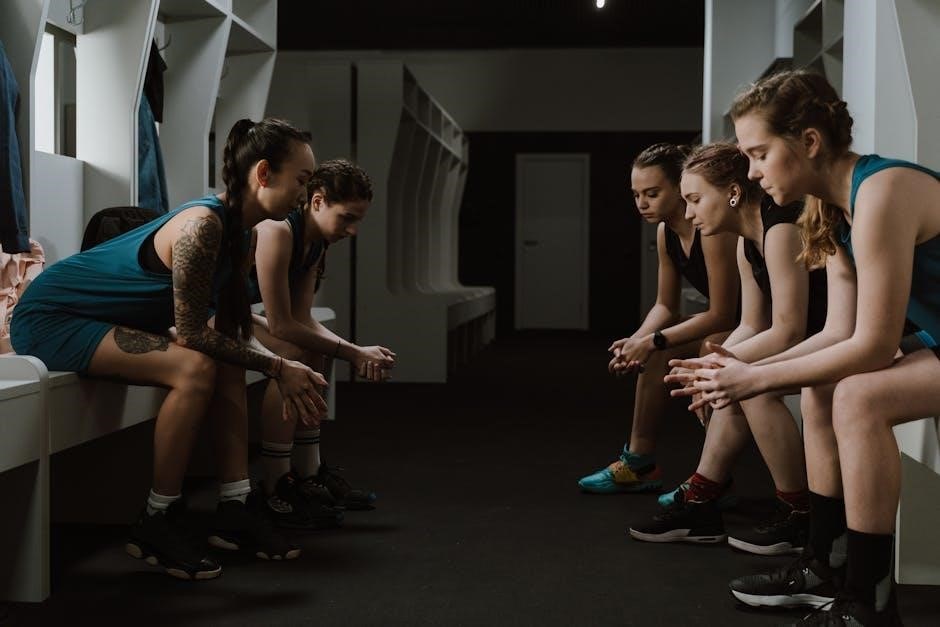Defining Mental Toughness in the Context of Youth Sports
Mental toughness is a critical determinant of success in youth sports, enabling athletes to thrive under pressure. It involves resilience, stress management, and a positive mindset, helping young athletes navigate challenges and setbacks effectively. This blend of skills allows them to overcome obstacles, making it a key differentiator in competitive environments.
Overview of Mental Toughness and Its Importance
Mental toughness is a psychological attribute that enables young athletes to perform at their best, even in challenging situations. It involves a combination of resilience, focus, and confidence, allowing athletes to navigate stress and setbacks effectively. Developing mental toughness is crucial in youth sports, as it helps athletes manage pressure, bounce back from failures, and maintain motivation. This skill set not only enhances athletic performance but also fosters personal growth. By cultivating mental toughness, young athletes can build a strong foundation for overcoming obstacles both on and off the field. It is essential for coaches, parents, and athletes to understand its significance, as it complements physical skills and contributes to overall success in sports and life. Investing time in mental toughness training can empower young athletes to embrace challenges and reach their full potential.
Myths and Misconceptions About Mental Toughness
Despite its importance, mental toughness is often misunderstood. One common myth is that it requires athletes to suppress emotions or avoid showing vulnerability. In reality, mental toughness involves acknowledging and managing emotions effectively; Another misconception is that it is solely about being “tough” or aggressive, which can lead to harmful behaviors. Instead, mental toughness focuses on resilience, adaptability, and maintaining a positive mindset under pressure. Some believe it is an innate trait, but it can be developed through practice and training. Additionally, mental toughness is not about avoiding setbacks but learning to view them as opportunities for growth. Dispelling these myths helps young athletes and coaches approach mental toughness in a healthy, constructive way, fostering both performance and well-being. Understanding its true nature is the first step in cultivating this essential skill for success in sports and beyond.

The Key Components of Mental Toughness for Young Athletes

Mental toughness for young athletes involves resilience, stress management, and a positive mindset. These components help athletes handle pressure, setbacks, and challenges while maintaining focus and confidence in their abilities.
Resilience and Stress Management

Resilience and stress management are cornerstone components of mental toughness for young athletes. Resilience empowers them to bounce back from setbacks, injuries, or losses, viewing these challenges as opportunities for growth rather than failures. Effective stress management techniques, such as mindfulness and breathing exercises, help athletes remain calm under pressure, ensuring they perform at their best. By mastering these skills, young athletes can navigate the emotional and psychological demands of competitive sports with confidence and composure, fostering a robust mental foundation that benefits both their athletic and personal lives. These practices not only enhance performance but also contribute to overall well-being, creating a balanced and mentally strong individual.
Goal Setting for Increased Motivation and Focus
Goal setting is a powerful tool for enhancing motivation and focus among young athletes, serving as a cornerstone of mental toughness. By establishing clear, achievable objectives, athletes create a roadmap for success, breaking down larger aspirations into manageable steps. This process fosters a sense of purpose and direction, keeping them motivated even during challenging times. Research indicates that athletes who set specific, measurable goals tend to perform better and maintain higher levels of focus. Additionally, celebrating the accomplishment of these goals builds confidence and reinforces a growth mindset. Effective goal setting not only drives performance but also teaches valuable life skills, such as discipline and self-accountability, which extend beyond the playing field. This practice is essential for cultivating the mental resilience and determination needed to excel in competitive environments.
Self-Talk and Positive Mindset
Self-talk and a positive mindset are integral components of mental toughness, empowering young athletes to stay confident and composed under pressure. Positive self-talk involves using encouraging, affirming statements to regulate emotions and maintain focus. This practice helps athletes reframe challenges as opportunities for growth rather than threats, fostering resilience. A positive mindset allows them to approach situations with optimism, which enhances performance and overall well-being. Research shows that athletes who practice positive self-talk experience reduced anxiety and improved problem-solving skills. By cultivating a positive inner dialogue, young athletes can build self-belief, stay motivated, and develop the mental strength needed to overcome setbacks. This skill is not just beneficial in sports but also in everyday life, promoting a healthier and more confident approach to challenges.
Developing Mental Toughness in Young Athletes
Developing mental toughness in young athletes involves fostering resilience, effective stress management, and a positive mindset through key practical exercises and important supportive influences and environments.
Practical Exercises for Building Resilience
Building resilience in young athletes involves practical exercises that help them cope with setbacks and challenges. One effective method is guided problem-solving, where athletes learn to identify problems, generate solutions, and implement strategies. Another exercise is reframing negative thoughts into positive ones, teaching athletes to view challenges as opportunities for growth. Journaling about past successes and how obstacles were overcome can also enhance resilience. Additionally, mindfulness practices, such as deep breathing and visualization, help athletes stay calm under pressure. Coaches and parents can encourage athletes to embrace a growth mindset, celebrating effort and progress rather than just outcomes. These exercises, when consistently practiced, equip young athletes with the mental strength to bounce back from failures and perform at their best. Over time, these skills become ingrained, fostering long-term resilience both in sports and life. Consistency and supportive environments are key to their effectiveness.
The Role of Mindfulness in Enhancing Mental Toughness

Mindfulness plays a pivotal role in enhancing mental toughness for young athletes by teaching them to stay present and focused under pressure. Simple yet powerful techniques, such as deep breathing exercises and visualization, help athletes manage stress and anxiety. Mindfulness practices encourage athletes to observe their thoughts without judgment, fostering emotional regulation and clarity. Regular mindfulness exercises can improve concentration, reduce distractions, and enhance overall performance. Dr. Harry Lim emphasizes that mindfulness complements resilience by helping athletes process setbacks constructively. Additionally, mindfulness promotes self-awareness, allowing athletes to recognize and adjust their mental states during competitions. By incorporating mindfulness into their routines, young athletes can develop a stronger, more composed mindset, enabling them to navigate challenges with confidence and poise. These practices are easy to implement and can be adapted to fit into daily training regimens, making them a valuable tool for building mental toughness. Mindfulness, when practiced consistently, becomes a cornerstone of mental resilience and focus.
Surrounding Yourself with Supportive Influences
Surrounding yourself with supportive influences is essential for building mental toughness in young athletes. Parents, coaches, and teammates play a crucial role in fostering resilience and confidence. A positive environment encourages athletes to embrace challenges and view setbacks as opportunities for growth. Supportive influences help instill a growth mindset, enabling young athletes to stay motivated and focused. Coaches who emphasize effort over outcome and parents who provide constructive feedback can significantly enhance an athlete’s mental toughness. Additionally, being part of a supportive team fosters camaraderie and mutual encouragement, which are vital for overcoming adversity. By surrounding themselves with positive influences, young athletes can develop the emotional strength needed to thrive in competitive sports. These supportive networks not only aid in building resilience but also help athletes maintain a healthy perspective on success and failure, ultimately contributing to their overall mental toughness and well-being.
Proven Strategies for Cultivating Mental Toughness
Proven strategies include 5-minute mindset exercises, embracing challenges, and using powerful techniques for focus and confidence. These methods help young athletes build resilience, stay motivated, and thrive under pressure in sports.
5-Minute Mindset Exercises for Kids and Teens
These short, effective exercises are designed to boost focus, confidence, and resilience in young athletes. Developed by experts like Troy Horne, they include activities such as mindfulness breathing, positive affirmations, and visualization techniques. One exercise involves focusing on a single task for five minutes without distractions, helping to improve concentration. Another encourages writing down three positive thoughts to replace negative self-talk, fostering a growth mindset. Additionally, guided visualizations of successful performances help build confidence and mental clarity. These exercises are simple, engaging, and can be done anywhere, making them ideal for busy schedules. By incorporating these practices, young athletes can develop the mental strength needed to overcome challenges and perform at their best. Regular use of these exercises creates a strong foundation for long-term mental toughness and resilience in sports and life.
Embracing Challenges as Opportunities for Growth
Encouraging young athletes to view challenges as opportunities for growth is essential for developing mental toughness. This mindset helps them understand that setbacks are not failures but stepping stones for improvement. Coaches and parents can foster this perspective by reframing obstacles as chances to learn and gain resilience. For example, a difficult game or practice can be seen as a way to refine skills and build confidence; By embracing challenges, athletes develop a growth mindset, believing their abilities can improve with effort and perseverance. This approach not only enhances performance but also equips them with lifelong skills to handle adversity. Teaching young athletes to focus on progress rather than perfection helps them stay motivated and resilient in the face of challenges, both on and off the field.
Using Powerful Techniques for Focus and Confidence
Young athletes can benefit from powerful techniques that enhance focus and confidence, fostering mental toughness. Visualization is a key method, where athletes mentally rehearse successful performances, building confidence and clarity. Breathing exercises, such as deep, controlled breaths, help maintain composure under pressure. Positive affirmations, like repeating empowering phrases, reinforce self-belief. These practices train the mind to stay centered and focused, even in high-stakes situations. Coaches and parents can guide athletes in applying these techniques during practice and competitions. Over time, these tools become second nature, boosting resilience and performance. By mastering such strategies, young athletes can approach challenges with unwavering focus and confidence, essential for achieving their full potential in sports and beyond.